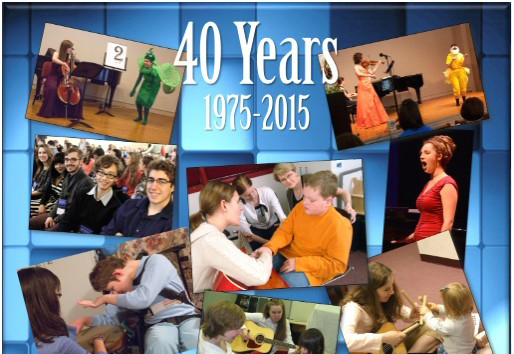 Some of our strongest memories are connected to music heard over and over throughout our lives. Have you ever been transported back in time to an important event in your life when a certain song comes on the radio? This experience is used by music therapists to help their clients. Music can distract from or block pain during childbirth, positively impact the brain of a trauma patient and provide a timing cue to a client with Parkinson’s to improve balance while walking.
Some of our strongest memories are connected to music heard over and over throughout our lives. Have you ever been transported back in time to an important event in your life when a certain song comes on the radio? This experience is used by music therapists to help their clients. Music can distract from or block pain during childbirth, positively impact the brain of a trauma patient and provide a timing cue to a client with Parkinson’s to improve balance while walking.
Gene Anne Behrens, professor of music and director of music therapy at Elizabethtown College, feels that music therapy is a misunderstood practice, with a significant part of society not knowing what the therapists do. “It is still healthcare’s best kept secret,” she said. Behrens defines music therapy as “the means by which we … interact and respond to our clients.” Music is not only the means, she said, but also the message. From pre-birth to the process of dying, music therapists work with a wide range of populations. As more research is documented, more people are coming to know about music therapy’s benefits.
As a profession, music therapy, began in the 1950s, and the program at Elizabethtown College was formally adopted in 1975. The size of the program, according to Behrens, has essentially doubled since 2002. She took over as the program’s director in 2004 and, although there is no formal history of the program, she said the field has changed over the years, as has the College program.
It is still healthcare’s best kept secret.”
One of the most significant changes is the emphasis on research. Since 2002, students have completed more than 70 research projects which Behrens feels is a good amount for the size of the program. Students are presenting these projects at the regional and national levels alongside professionals and graduates. “They’re doing a phenomenal job,” Behrens said. “Our students won the undergraduate research award two out of the three times it’s been available.” This sets a focus for all students to interact with research and continue doing so after they graduate, she said.
Another change is the experiential part of the program. Behrens implemented a platform using developmental spiral curriculum theory. “You introduce them and re-introduce them to skills and goals,” Behrens explained. “You don’t just teach it once but … in a developmental sequence.” In order to accomplish this, Elizabethtown College music therapy students begin observations within their first two semesters, which leads to the beginning of five semesters of clinical work. Behrens said this exposes E-town students in a progressive way; students at other colleges, she said, don’t get this experience until their junior year.
Elizabeth Ghiorzi, Elizabethtown College Class of 2000 music therapy graduate, is familiar with other music therapy programs, and she agrees that they are nowhere near as comprehensive or intensive as the program at Elizabethtown. “It’s almost something you don’t really appreciate until you’re out,” she said. “You feel so much more prepared.” Since graduating, Ghiorzi has worked with a variety of populations and is now an independent contractor for Tempo Music Therapy Services in West Chester, Pennsylvania. In addition, she supervises students at E-town two nights a week and teaches piano lessons adapted for the autistic spectrum. “I think that supervision has been one of the best [experiences] … being able to come back and use what I learned here,” Ghiorzi said.
In order to fully celebrate 40 years at Elizabethtown, the program is sponsoring an anniversary event Saturday, Sept. 24, at the College. A majority of the current music therapy students and 54 alumni will attend, Behrens said. The big part of this event, she noted, is a gift back to the alumni of seven free Continuing Music Therapy Education Credits (CMTE). The CMTE credits would normally cost $300 to $400.
Ghiorzi said she likes this opportunity to reconnect with other alum and earn the credits. “The program has grown so much [and] the amount of work Dr. Behrens does is incredible.”
Behrens, herself, said she could not pick a portion of the day she was most excited for. There will be a skit about the history of the program, a drum circle, speed-dating style networking, a photo booth, and the day will end with an open mic pick-up band, which Behrens feels is a fitting closure to the event. “In the long run we all love to make music,” Behrens said. “[And as music therapists] we get to use this very wonderful tool … [and] be able to change people in a variety of different ways. It’s a great gig.”

